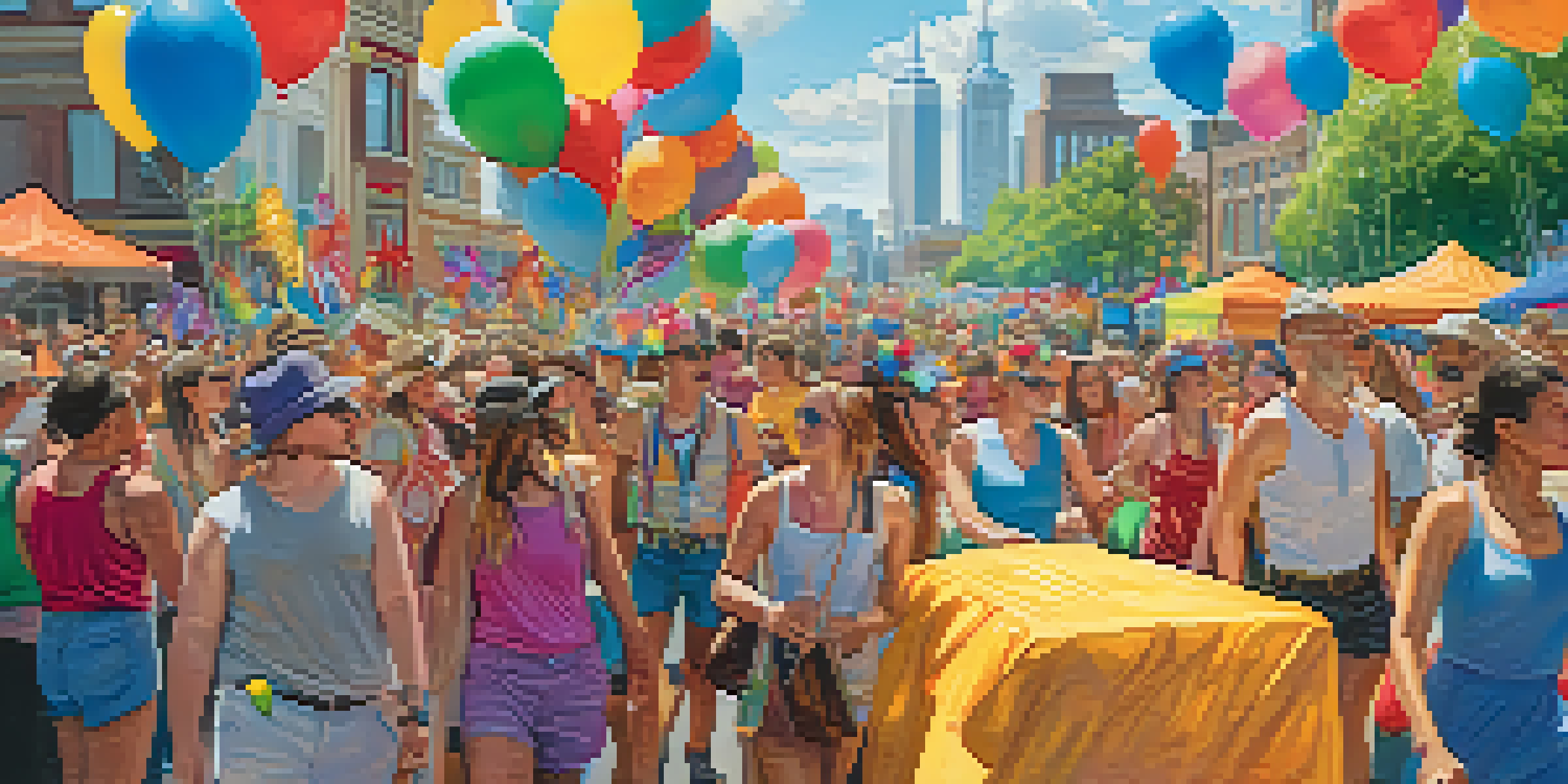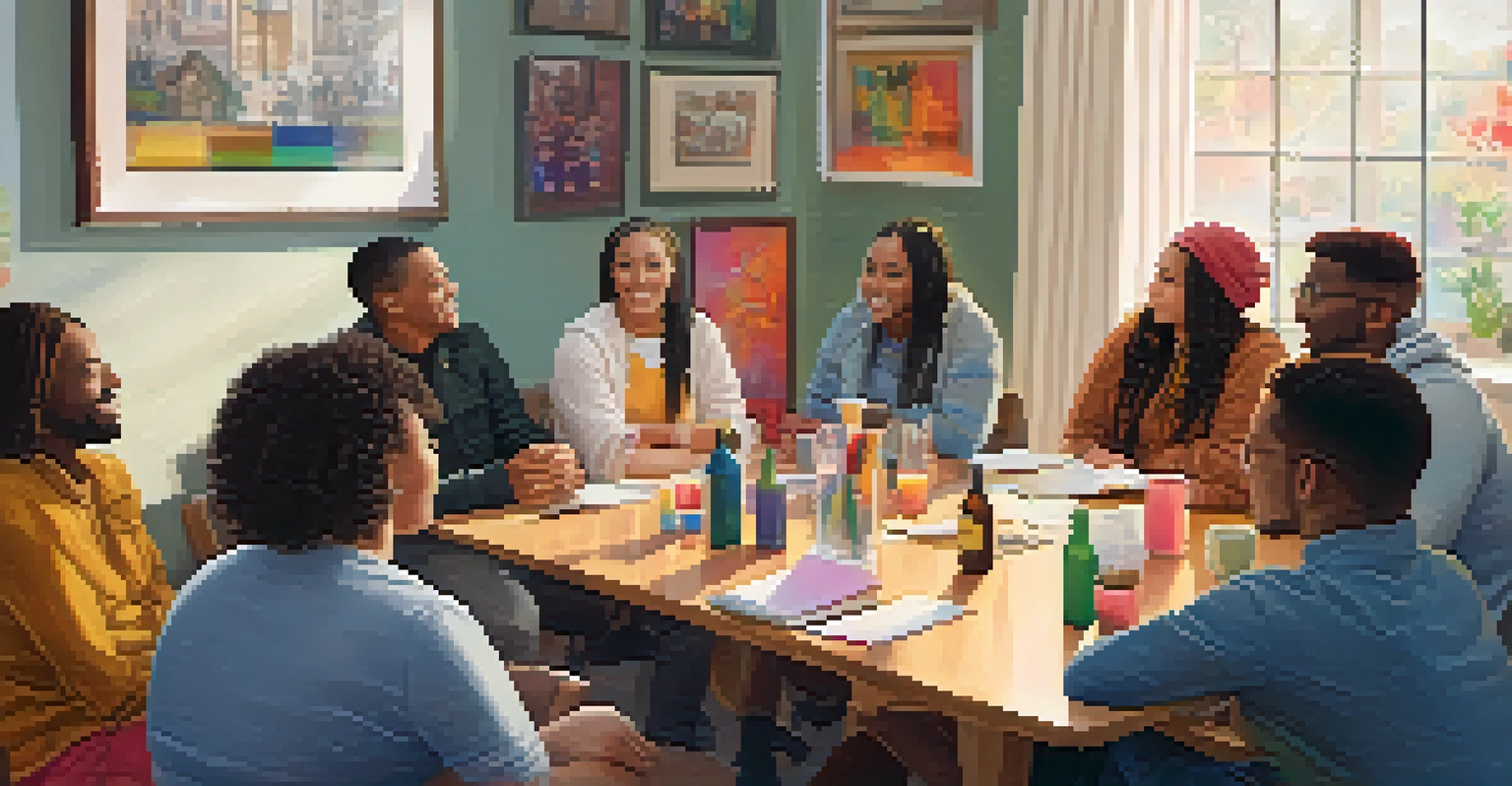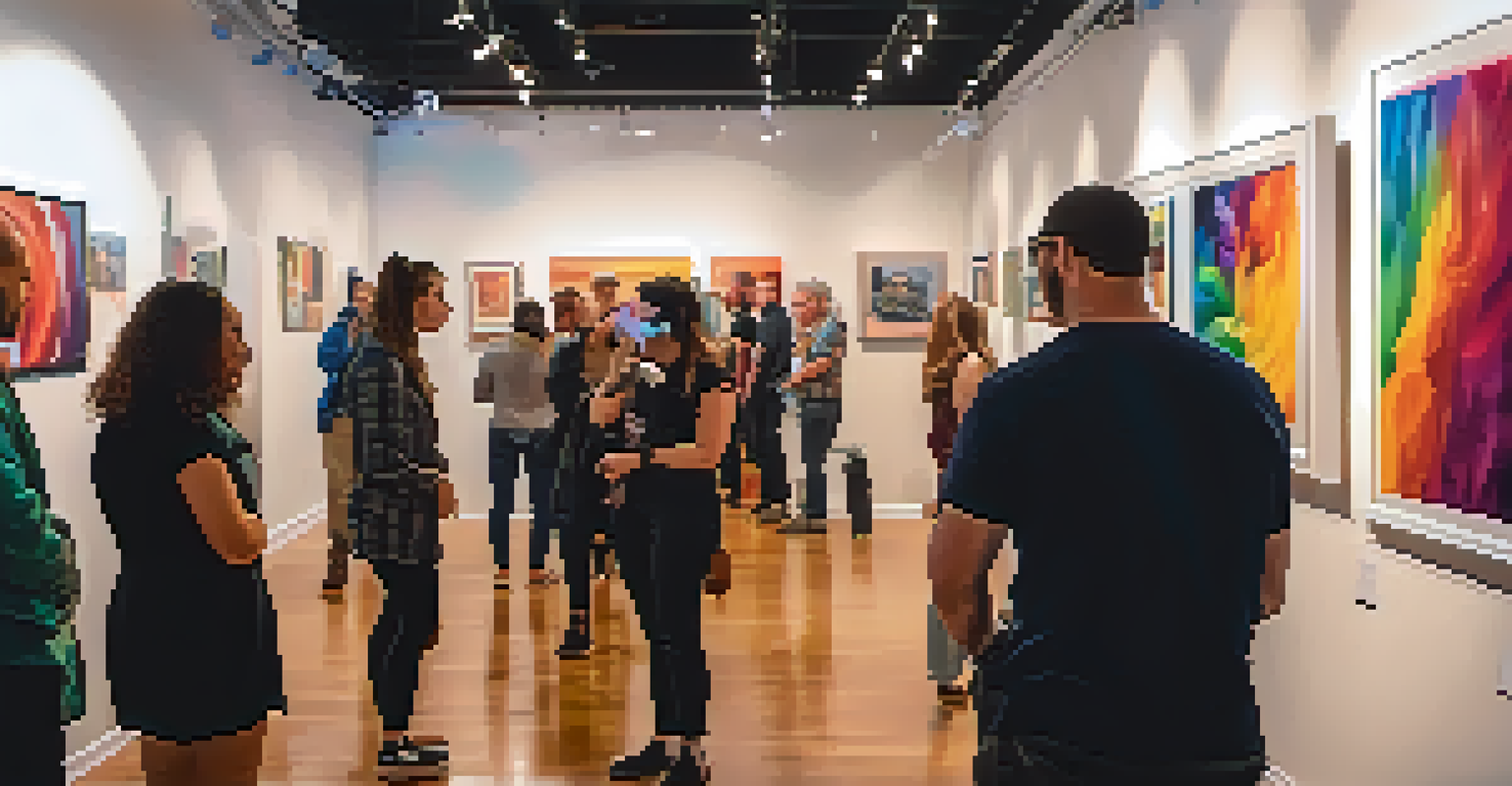The Evolution of LGBTQ+ Rights in Portland Over the Decades

The Early Days: 1960s and 1970s Activism
The 1960s and 1970s marked a pivotal moment for LGBTQ+ rights, as activists began to organize against systemic discrimination. In Portland, the burgeoning gay rights movement mirrored national trends, with groups like the Daughters of Bilitis paving the way for conversations about equality. This was a time of both hope and struggle, as LGBTQ+ individuals fought for visibility and acceptance in a society that largely marginalized them.
The arc of the moral universe is long, but it bends toward justice.
One significant event was the 1969 Stonewall Riots in New York City, which inspired similar activism across the country, including in Portland. Local organizations began forming, and the first Pride marches were held, serving as a powerful statement of existence and resilience. These early efforts laid the groundwork for future advancements, highlighting the importance of community and solidarity.
Despite the challenges, these decades were characterized by a growing sense of identity and purpose among LGBTQ+ individuals. Activists worked tirelessly to challenge discriminatory laws and social norms, fostering a sense of pride that would continue to grow in the years to come. The seeds of change were being planted, setting the stage for the progress that lay ahead.
The Fight for Legal Recognition: 1980s and 1990s
The 1980s and 1990s saw intensified efforts for legal recognition and protection of LGBTQ+ rights, particularly in the wake of the AIDS crisis. Activist groups like ACT UP emerged, advocating for healthcare access and raising awareness about the epidemic, fundamentally changing public perception of the LGBTQ+ community. In Portland, local leaders rallied to support those affected, marking a turning point in community solidarity.

During this period, significant legal battles were fought at both state and national levels. Portland witnessed the establishment of anti-discrimination ordinances and the fight for domestic partnership laws, reflecting a shift towards greater recognition of LGBTQ+ rights. These efforts were often met with resistance, but the determination of activists kept the momentum going.
LGBTQ+ Activism Emerges
The 1960s and 1970s saw the rise of organized LGBTQ+ activism, inspired by events like the Stonewall Riots, fostering community and resilience.
The 1990s also brought about the establishment of Pride festivals as a means to celebrate LGBTQ+ identity and community strength. These events became essential in fostering visibility and solidarity, drawing large crowds and raising awareness about the ongoing struggles for equality. The combination of activism and celebration helped to normalize LGBTQ+ presence in Portland’s cultural landscape.
Legal Milestones: Marriage Equality and Beyond (2000s)
The 2000s proved to be a transformative decade for LGBTQ+ rights, culminating in significant legal milestones, particularly in the realm of marriage equality. In 2004, Multnomah County briefly issued marriage licenses to same-sex couples, sparking a heated debate that captured national attention. This bold move by local officials underscored Portland's reputation as a progressive city and highlighted the urgency of the fight for equal marriage rights.
Injustice anywhere is a threat to justice everywhere.
The landmark moment came in 2015 when the U.S. Supreme Court ruled in favor of marriage equality nationwide. This decision was celebrated across Portland, as couples who had long awaited this right could finally marry legally. The ruling was a testament to the years of activism and advocacy, showcasing the power of community mobilization and the importance of allyship.
However, while marriage equality was a monumental win, it also prompted discussions about the ongoing issues facing the LGBTQ+ community, such as discrimination and inequity in various sectors. Activists recognized that the fight was far from over and continued to advocate for comprehensive protections and rights for all members of the community, emphasizing the need for a more inclusive society.
Challenges and Backlash: The 2010s
Despite significant advancements, the 2010s brought new challenges and a rise in backlash against LGBTQ+ rights, often fueled by political rhetoric and societal divisions. In Portland, activists faced the dual challenge of celebrating progress while also combating hate and discrimination. This period highlighted the need for ongoing vigilance and advocacy to protect hard-won rights.
One notable incident was the rise of anti-LGBTQ+ legislation in various states, which galvanized Portland's LGBTQ+ community and allies to take action. Activists organized protests and educational campaigns, emphasizing the importance of standing up against injustice in all forms. The community's resilience was evident as they rallied together to push back against harmful narratives.
Legal Milestones Achieved
The 2000s marked key legal victories for LGBTQ+ rights, including the push for marriage equality, which culminated in the Supreme Court ruling in 2015.
Additionally, the 2010s saw a growing focus on intersectionality within the LGBTQ+ rights movement. Activists began to address the unique challenges faced by marginalized groups within the community, including people of color and transgender individuals. This shift towards inclusivity helped to strengthen the movement, fostering deeper connections and understanding among diverse community members.
Recent Developments: The 2020s and Current Landscape
As we entered the 2020s, the fight for LGBTQ+ rights in Portland continued to evolve, reflecting broader societal changes and challenges. The COVID-19 pandemic affected many aspects of life, including LGBTQ+ support services, but community organizations adapted swiftly to provide virtual resources and support. This resilience showcased the importance of community bonds in times of crisis.
In recent years, there has been a renewed focus on issues such as transgender rights, healthcare access, and racial equity within the LGBTQ+ community. Activists have been vocal about the need for comprehensive policies that protect all individuals, regardless of gender identity or sexual orientation. This ongoing dialogue has helped keep the community engaged and informed about critical issues.
Furthermore, Portland has seen an increase in visibility for LGBTQ+ people in various sectors, from politics to business. As more individuals openly embrace their identities, the city continues to foster an environment of acceptance and celebration. The progress made in the past decades serves as a reminder of the power of community, activism, and the ongoing journey towards equality.
The Role of Community Organizations in Advocacy
Community organizations have played a crucial role in the evolution of LGBTQ+ rights in Portland, serving as both support networks and advocacy groups. From the early days of the movement, these organizations have provided essential resources, education, and empowerment for individuals navigating their identities. Their efforts have been instrumental in fostering a sense of belonging and community.
Organizations such as Basic Rights Oregon and Q Center have been at the forefront of advocacy, working tirelessly to promote equality and challenge discriminatory practices. Their initiatives range from legislative advocacy to educational programs, ensuring that the voices of LGBTQ+ individuals are heard and represented. The impact of these organizations cannot be overstated, as they continue to be a lifeline for many.
Ongoing Challenges Persist
Despite advancements, the 2010s highlighted new challenges for the LGBTQ+ community, including backlash against rights and a focus on intersectionality.
Moreover, these community groups have adapted over the years to address emerging issues and needs within the LGBTQ+ community. By prioritizing inclusivity and intersectionality, they strive to create a more equitable environment for all, regardless of background. This commitment to advocacy is a testament to the strength and resilience of the LGBTQ+ community in Portland.
Celebrating Diversity: Pride and Cultural Events
Celebrating diversity and identity has always been a cornerstone of Portland's LGBTQ+ community, with Pride events serving as a vibrant expression of this spirit. Each year, the Portland Pride Festival brings together thousands of individuals to celebrate love, acceptance, and equality. These festivities not only honor the history of the LGBTQ+ movement but also highlight the ongoing fight for rights and recognition.
Beyond the parade, Pride events often feature educational workshops, performances, and art showcases that reflect the richness of LGBTQ+ culture. These gatherings create a space for connection, empowerment, and visibility, reminding participants of the progress made and the work that still lies ahead. The energy and enthusiasm at these events exemplify the strength of community bonds.

In addition to Pride, Portland hosts a variety of cultural events throughout the year, showcasing LGBTQ+ artists, filmmakers, and activists. These events foster a sense of belonging and celebrate the diverse experiences within the community. By amplifying LGBTQ+ voices, Portland continues to champion inclusivity, ensuring that everyone can share in the celebration of their identities.